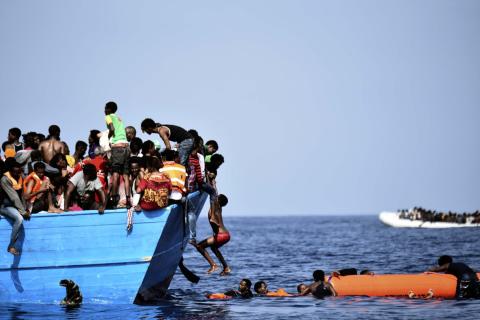
While one remains genuinely non-committal, the other welcomes the stranded victims in its bowels, then sneezes them out at the slightest tickle, most times, out of a selfless attempt to remain non-aligned. That is the reality spun by the President Muhammadu Buhari-led administration.

“If I were Nigeria,” my father said to me as we had a long-delayed conversation on the veranda of his single-storey house, “I will colonise São Tomé and all the islands up to Gabon; because the west could use those areas to destabilise us.”
That frank view expressed by my dad who schooled in Japan in the seventies and not in any western state like his peers, has some merit. It speaks to what type of voice Nigeria has or does not have, in the global jungle of diplomacy, where ‘survival of the fittest’ is truly enacted. If I was called out to explain what type of creature Nigeria is in the diplomatic wild, here is what I will say: "Nigeria is from a species of elephants that are so tame, they run for cover in times of danger and turn on their own in times of anger."
This image of sheer helplessness, utter abandonment, has been bludgeoned into my hair-covered skull many a bloody time. A lot of it was imagined until I stepped into the reality of a refugee camp for the first time in my drab existence.
"If it bleeds, it leads," is one expression that has made a usage tour of journalistic endeavours, chiefly in the academic arc of the profession. Eric Pooley expressed that feeling to speak of the media’s love for the grim.
My interpretation has a detour from the generally held view though. The media bleeds in order to shine its amber lights, believing that concerned officials will rise to the rescue. Among these much-hoped leaders are numbered three chief strata; those who would see the amber lights, hear the shrill cries and see the gory images, yet remain passive. There are the canine masters; holding dogs that strain on their leash, waiting to create more gore for the screens to magnify. There are the ‘game makers', rolling down huge slabs of ice, torching one gnarled tree, releasing the odd floodgate.
Of those passives, there are two shades. While one remains genuinely non-committal, the other welcomes the stranded victims in its bowels, then sneezes them out at the slightest tickle, most times, out of a selfless attempt to remain non-aligned. That is the reality spun by the President Muhammadu Buhari-led administration. The pleading voices of some of his victims have been with me for almost a year now and I remember when it all started.
He walked into the building, lured by the belief he was scheduled to be interviewed. Heck, he was desperate, searching for a platform in his land of refuge to tell his bleeding tale. The safety he felt he had, was a thin one. He was one of the organisers of demonstrations that snowballed into persecution in Southern Cameroon between December and January of 2017. The Nigerian government were trying their desperate best to be welcoming, but still non-aligned with the English-speaking tribe of 20 million people forced by the global front of the ’game makers’, the United Nations to live what has turned out to be an interminable life of oppression under a different tribe of persons colonised by the French in a territory known as Cameroon.
I was already buried deep in the unfolding crisis, before a confused colleague came to inform the production lead that a man claiming to be from Southern Cameroon was here seeking to be interviewed. He had been mistaken for a pastor, who was scheduled for a studio session.
I recall convincing my lead to give him a hearing. He hands over his phone to me that I may record the ensuing conversation between me and the hunted Southern Cameroonian. I step into the lounge and cozy up to the stranger that the phone might pick up as much of the fright, terror and escape he endured to reach Lagos. I have never understood what it means to see since I knew my name, but, I remember his smell; the nauseating reek of tablets. One more thing, he wore a suit or maybe a jacket. When I reported the entrails of my discourse, the running dissident got his time on air. Take away the horrid tales he told, like, a woman losing seven children, some claimed by the river as she crossed into Nigeria, persons sleeping in bushes, villages severed like dried branches and you will remember he called the African Union "a toothless bulldog", if you watched the interview that is.
I was no journalist without a heart like I was trained to be after hearing all that. I pressed the office for more support, a campaign to get the passives in Abuja to rise from their comfy chairs, like Théoden, Lord of Rohan in Tolkien’s Lord of the Rings did when his neighbours called for help.
All my pleading found me in Cross River, speaking and engraving in my heart, the words, losses and voices of beings displaced by their should-be government.